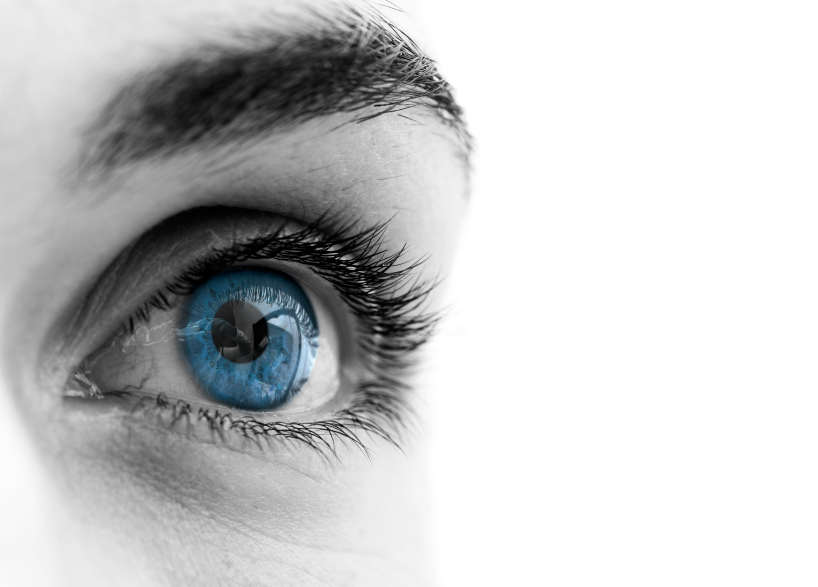What is glaucoma?
Glaucoma is a disease of the eye which affects the nerve of the eye, the optic nerve. The optic nerve is the “cable” which transmits the vision captured in the eye to the brain, which then interprets the information and allows you to see. This nerve runs from the brain to the back of the eye. Glaucoma causes the nerve not to function completely. When the nerve stops working, you can go completely blind.
What Causes Glaucoma?
We do not know everything about this disease yet. The theory for the cause of glaucoma is the pressure inside the eyeball is too high and causes the nerve where it attaches to the eye to die off. This is usually a slow process, although it can happen suddenly (see Types of Glaucoma below). There are other factors too which cause glaucoma to develop, such as family history, the thickness of the cornea (front part of the eye), blood pressure, diabetes, age, and ethnicity which play a role in the development of the disease. Certain medications can also cause the pressure inside the eye to rise, predisposing you to glaucoma.
Is glaucoma different from cataracts?
Glaucoma is not the same as cataracts. Cataracts are when the lens in the eye gets cloudy. Both glaucoma and cataracts can cause vision loss, but in different ways. Cataracts can be removed surgically, and vision can be restored. Glaucoma is treated with eye drops, laser, or surgery. Vision once lost from glaucoma, it can’t be restored. Once the nerve is damaged, we do not have a way to repair it at this time. Occasionally cataracts can cause glaucoma or worsen the eye pressure, and so both cataracts and glaucoma will be treated at the same time. (More on cataracts and glaucoma)
How can Glaucoma be Prevented?
Screening is the best preventative measure you can take. Your eye doctor will check your pressure and should look at the appearance of the optic nerve at a yearly check-up. Also, controlling your blood pressure (too low is also dangerous), and your blood sugar are good preventative measures. Avoiding prolonged usage of medications which raise your eye pressure will also help prevent vision loss.
Different Types of Glaucoma
Slow developing: The slow developing type is called Open Angle Glaucoma. This is the most common type of glaucoma. This develops slowly with no symptoms. Your eye feels normal and your vision seems normal. The beginning stages causes loss of peripheral vision which is very subtle. Most people do not notice this vision loss. Over years, if untreated, the visual loss will get worse until you develop tunnel vision, and finally can go completely blind.
Treatment:
- usually eye drops are given to lower the eye pressure. These are taken once, twice, or three times a day depending on the type of drop. These will need to be taken every day. Your eye will not feel any different and your vision usually does not change with these drops. They are preventing further damage to your eye.
- Laser can also lower the eye pressure. For certain people, laser will work best, but does wear off over time, necessitating further laser or eye drops. Your vision is not changed by this type of laser. It is to prevent the pressure from rising and further damage to your eye.
- Surgery can also lower the eye pressure. A new drainage system is formed or inserted into the eye to lower the pressure. Your vision will not improve with this surgery. Again it is to save your remaining vision and prevent further damage to your eye.
Fast developing: The faster type of glaucoma is called Angle Closure Glaucoma. This develops very quickly over minutes or hours and causes severe pain. The pain can cause nausea and vomitting. The eye usually turns red and your vision gets blurry. This type of glaucoma is an emergency!! If left untreated, you will go blind very rapidly. Sudden, severe eye pain, with redness, and some blurred vision should be seen at an emergency center or ophthalmologist office ASAP.
Treatment:
- Immediate treatment is needed. This treatment is usually several eye drops and possibly even an IV medication to lower the eye pressure quickly. A laser treatment and possibly surgery is needed very soon as well. These treatments will prevent blindness, and can usually can restore your vision if done soon enough.


Comments are closed.